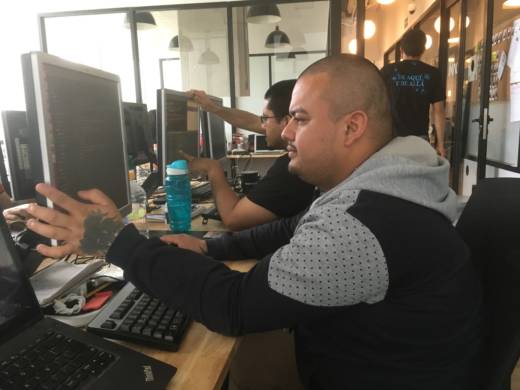Inside glass-laden offices, he and the other students hover over laptops while lounging on couches. There’s a ping-pong table and beer on tap. It’s a scene straight out of Silicon Valley. But this is Mexico City. And these engineers were born south of the Rio Grande and grew up in the United States without documentation.
Tapia is short with a shaved head, easy smile and a large tattoo on his hand that his sweatshirt doesn’t cover. He moved to the San Fernando Valley when he was 11 to live with his dad. He went to school there but missed his mom, who still lived in Mexico. At 23, Tapia returned.
“It was hard just leaving my dad back in the states. I was like, ‘I’m finally going to see my mom and my whole family,’” he recalls.
Hola Code is modeled off Hack Reactor, a San Francisco coding school. Students here are in class 70-plus hours a week. They also learn soft skills, like job interviewing. The start-up is funded by Mexican angel investors who support the group’s goal of training returnees. If the returnees get coding jobs at the end of it, they pay back the cost of the class.
Scott Yoon taught at Hack Reactor before joining Hola Code, inspired by its socially-driven mission. He says the stakes here are a lot higher.
“Here we have to really provide them with support and make sure they don’t fall behind, because if they fall behind, they go out on the street,” he says.
A lot of the students sleep in the office – commuting can be dangerous. And Hola Code also offers therapy.
“The constant narrative is that they miss their families. Some of them are married and have kids in the states. There are cases of people who haven’t seen their parents in like 7 years,” says Aida Chavez, who counsels the students.
Tapia agrees that the course isn’t easy. But he’s motivated. He wants to develop an app that would let victims of violence in Mexico immediately alert the police.
“I don’t want to go back to call centers. So that’s why I am putting a big effort into learning this. So I can have a better job. Better life for me and my family,” he says.

